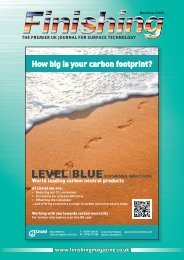International Aquafeed Directory 2023-24
Welcome to the 27th edition of the International Aquafeed Directory & Buyers’ Guide 2023/24, the essential guide for everyone involved in the global aquafeed industry. Last year I wrote about the effects of the war, and the challenges resulting from rising fuel costs, but the industry showed great resilience. The impact of inflation and reduced consumer spending dampened growth in the market at the beginning of the year, but an expected increase in aquaculture production will compensate for a mall decline in wild catches. This edition contains information relating to 450+ businesses and over 850 products, coupled with useful and practical information including the extruder and expander guide. We would like to take this opportunity to thank all the businesses that have contributed to the completion of this directory. I also hope that all of our readers across the world remain safe and well.
Welcome to the 27th edition of the International Aquafeed Directory & Buyers’ Guide 2023/24, the essential guide for everyone involved in the global aquafeed industry.
Last year I wrote about the effects of the war, and the challenges resulting from rising fuel costs, but the industry showed great resilience. The impact of inflation and reduced consumer spending dampened growth in the market at the beginning of the year, but an expected increase in aquaculture production will compensate for a mall decline in wild catches.
This edition contains information relating to 450+ businesses and over 850 products, coupled with useful and practical information including the extruder and expander guide.
We would like to take this opportunity to thank all the businesses that have contributed to the completion of this directory. I also hope that all of our readers across the world remain safe and well.
Create successful ePaper yourself
Turn your PDF publications into a flip-book with our unique Google optimized e-Paper software.
17<br />
AQUACULTURE ASC AQUACULTURE<br />
ASC Group Certification supports<br />
small-scale farms<br />
farmed fish is an issue for the salmon<br />
industry. The revised requirements<br />
under Criterion 3.1 address these<br />
concerns by establishing best practices<br />
in managing potential disease and<br />
parasite risks linked to sea lice.<br />
A series of significant changes to the<br />
previous requirements have been made.<br />
The revised standard requires farms to<br />
not only monitor the sea lice species<br />
L. salmonis, but to also include the<br />
less-researched species Caligus, where<br />
applicable (especially British Columbia,<br />
Canada). This will support a better<br />
understanding of the abundance of this<br />
species as a basis for future revisions.<br />
Additionally, to improve consistency of<br />
data collection and analysis, the new<br />
version establishes a clear sea lice<br />
sampling protocol for farms detailing<br />
frequency and sample size among other<br />
factors.<br />
In the previous version of the<br />
standard, exceedance of sea lice limits<br />
was not always immediately identified<br />
or actioned, depending on audit<br />
timings. The new standard addresses<br />
this gap by requiring farms to inform<br />
the Conformity Assessment Bodies<br />
(CABs) within one working day if the<br />
sea lice limit is reached and take<br />
corrective action. If the farm fails<br />
to bring sea lice levels below the<br />
threshold within 21 days, the ASC<br />
certification shall be cancelled, therefore<br />
prohibiting farms from selling fish as<br />
ASC-certified.<br />
ASC Group Certification supports<br />
small-scale farms<br />
More than 1,000 small-scale farms have<br />
already earned ASC certification<br />
for responsibly farmed seafood, as a<br />
result of ASC’s group certification.<br />
Globally, a significant majority of<br />
farmed seafood comes from small- to<br />
medium-sized producers. It is crucial<br />
that ASC certification be accessible to<br />
these smaller businesses around the<br />
world.<br />
Four producer groups have earned<br />
ASC certification so far: the PT<br />
Central Proteina Prima Farm group in<br />
Indonesia, with 560 Pacific white<br />
shrimp (Litopenaeus vannamei) farms;<br />
Minh Phu Mangroves Shrimp Social<br />
Enterprise in Vietnam, a group of 450<br />
giant tiger prawn (Penaeus monodon)<br />
farms; Jusanhama Gyokyo Youth<br />
Association in Japan, a cooperative of<br />
19 seaweed farms producing Japanese<br />
kelp and wakame (Laminaria japonica<br />
and Undaria pinnatifida) and the<br />
Azuma-cho Fisheries Cooperative<br />
Association of seven Japanese amberjack<br />
(Seriola quinqueradiata) farms in<br />
Japan.<br />
Group certification recognises groups<br />
of smaller producers that have joined<br />
together - for example, cooperatives and<br />
associations – which can jointly<br />
implement the requirements of the ASC<br />
standards. The group shares the costs,<br />
administrative function and other<br />
resources involved in that implementation<br />
and in the third-party audit that<br />
assesses whether they have fulfilled the<br />
standards.<br />
Many consumers want to know they<br />
are supporting small farmers, and<br />
through ASC group certification, retail<br />
and foodservice companies now have<br />
the assurance they need that seafood<br />
from smaller producers is coming from<br />
verifiably responsible farms.<br />
To ensure that the integrity of the ASC<br />
standard holds as strong for group<br />
certification as individual producer<br />
certification, the standards are not<br />
adjusted for groups to become certified,<br />
and every part of a group must meet the<br />
standards’ requirements to achieve ASC<br />
certification.<br />
Each group appoints a management<br />
body that oversees the steps along the<br />
way toward certification, including<br />
educating the farmers, guiding them into<br />
compliance with the ASC standards,<br />
liaising with the auditor, and maintaining<br />
a centralised management system for<br />
the group. The manager serves as a<br />
reliable point of contact for buyers who<br />
want to source ASC certified product<br />
from the group.<br />
Scottish salmon farms seeking ASC certification on the increase.<br />
Salmon farm, Mowi, UK.<br />
INTERNATIONAL AQUAFEED DIRECTORY <strong>2023</strong>/<strong>24</strong>

















